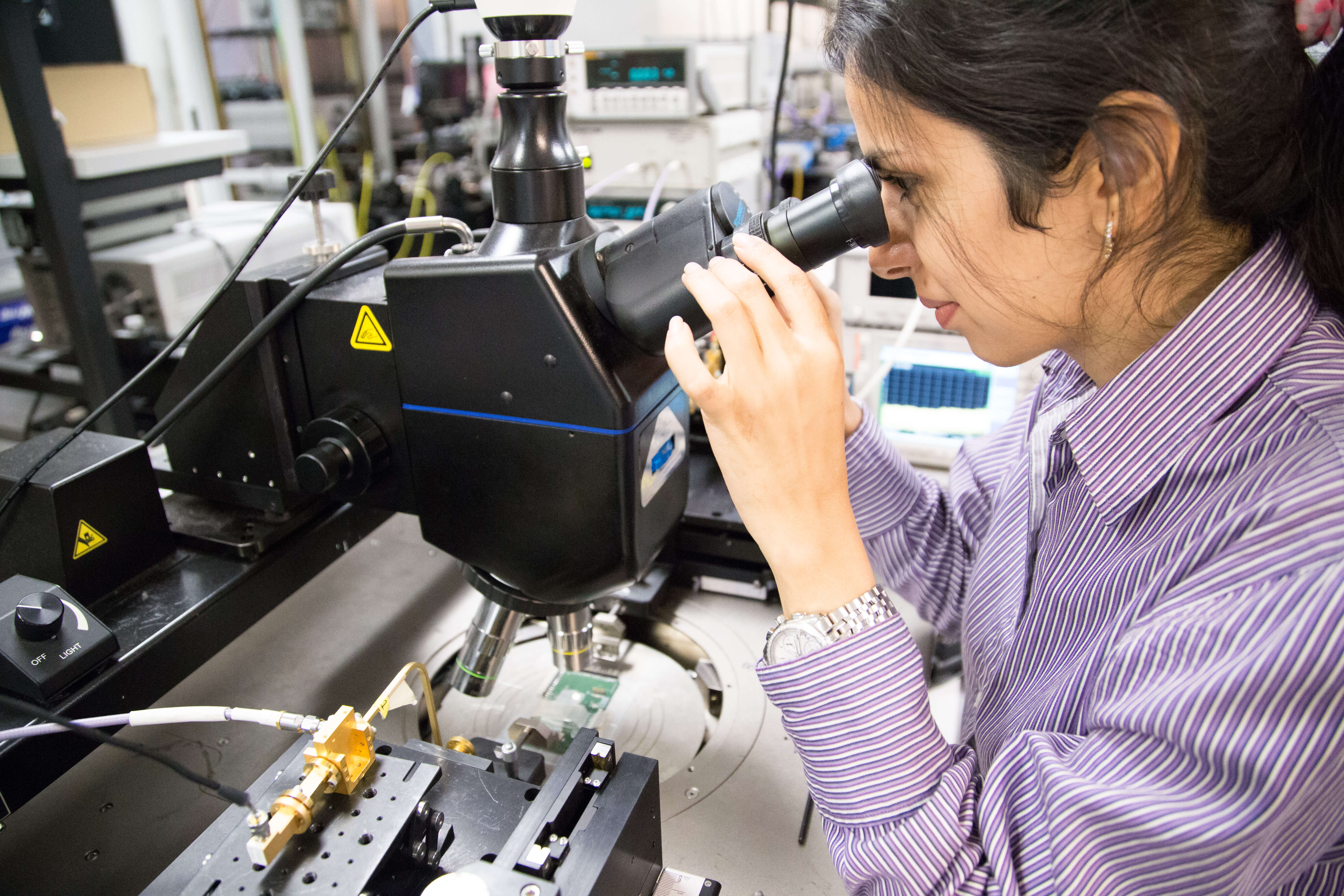Ask Laura Mueller what she valued most about her time at The University of Texas at Dallas (UT Dallas) and she’ll give you two answers: theoretical knowledge and research opportunities in state-of-the-art laboratories. “This combination laid a solid foundation for hands-on industry experience and influenced my approach to working with others and solving challenging problems with unclear answers,” she shares.
Add guidance from a supportive faculty, and Mueller evolved into the bubbly and dynamic professional she is today. Her UT Dallas experience taught her that effective problem solving, and a willingness to collaborate will take you places.
Those attributes have certainly taken her far. Today, the Master of Science in Electrical Engineering graduate is climbing the ranks at Texas Instruments. Her job is to listen, understand and respond to customers’ semiconductor needs. “Thanks to my UT Dallas background, I have a firm grasp on how certain semiconductor specifications impact our customers’ designs, and I respond by guiding our customers to leading edge products that address their challenges,” she explains.

At UT Dallas ECE, everyone has the opportunity to solve a wide range of technical problems in various professional environments. Source: UT Dallas
These outcomes are common for UT Dallas’s Department of Electrical and Computer Engineering (ECE) graduates. Three programs are especially ideal for fast-tracking this growth.
Here, students get a superior education as well as innovate imaginative solutions in five concentration areas — Circuits (which also includes RF and microwave), Computing Systems, Devices, Power Electronics and Energy Systems, and Signals and Systems (which also include machine learning and communications) — during their Master of Science in Electrical Engineering program. Students develop a broad understanding of both algorithms/software and circuitry/hardware during their Master of Science in Computer Engineering program. They gain a breadth of knowledge in both the software and hardware of telecommunications, as well as network theory and technology during their Master of Science in Telecommunications Engineering program.
Regardless of the degree program they choose, every student has an opportunity to solve a broad range of technical problems in various environments, the most formative of which include professional settings. UT Dallas ECE graduate students also benefit from an outstanding opportunity for practical job training.
“Our department has excellent relationships with industries, local and nationwide,” explains Dr. Jeong-Bong (JB) Lee, Associate Department Head for Graduate Studies.
A prime location helps too. UT Dallas ECE is centred in the heart of the Telecom Corridor — a thriving technology business centre in Richardson, Texas — one of the brightest economic regions in the world, accounting for over 130,000 jobs.
Last year, 138 ECE students reaped experiential rewards through an internship. The year before, 156 did. Virtually every student seeking an internship, obtained one. Arthur Pachachura, a computer engineering graduate, credits his current success to his internship with Credera, a global consulting firm. Today, he’s a full-time consultant in their Microsoft Solutions Practice division.
“The classes that I took at UT Dallas, specifically the ones in entrepreneurship and software design prepared me for actually even getting the internship that got me this job,” he shares.
Data confirms UT Dallas’s ability to propel graduates to success. According to the US Immigration and Customs Enforcement data on STEM OPT 2020, the university tops the table for its thriving international alumni. “This shows how large our programme is and how well-received our graduates are in the industry,” said Dr. Lee.
Many companies like to recruit UT Dallas ECE students. They include Qualcomm, Apple, Microsoft, Texas Instruments, Nokia Networks, Nvidia, Motorola, Skyworks Solutions, and Cisco Systems — and many more. In the past five years, Intel Corp. has hired 150 ECE graduates. These experts go on to earn salaries that range from US$90,000 to US$137,000.
Even more compelling is the fact that UT Dallas ECE offers some forms of financial assistance. As one example: The Jonsson School offers a competitive, merit-based scholarship to incoming graduate students worth US$1,000. More importantly, this scholarship also enables the recipient to pay the “in-state” tuition rate rather than “out-of-state.” The scholarship would cut tuition fees in half — if not more.
What’s more, students can apply for rewarding roles such as research or teaching assistantships. The former are supported by individual ECE faculty members through research grants; the latter are selected and supported by the department based on academic merit and teaching experience.
However you choose to go about securing your place, clearly, the outcomes will always be outstanding. “The Department of Electrical and Computer Engineering at UT Dallas provides the resources of a large research university and the community of a small private school,” enthuses Arun Gupta, former lead MEMS design engineer at Texas Instruments, and current founder and CEO of Skyven Technologies.
The graduate programmes in Electrical and Computer Engineering at UT Dallas provide “the flexibility to allow students to learn and succeed on their own terms. This is the ‘magical combination’ that makes UT Dallas so special.” To learn more about how UT Dallas ECE produces graduates that are highly qualified for rewarding and successful careers, click here.
Follow UT Dallas ECE on Facebook, Instagram, Twitter, and YouTube













